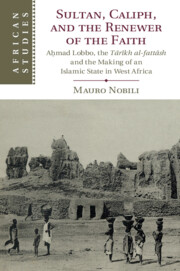 Sultan, Caliph, and the Renewer of the Faith
Sultan, Caliph, and the Renewer of the Faith Book contents
- Sultan, Caliph, and the Renewer of the Faith
- African Studies Series
- Sultan, Caliph, and the Renewer of the Faith
- Copyright page
- Dedication
- Contents
- Figures
- Maps
- Tables
- Acknowledgments
- Notes on Orthography and Other Conventions
- Introduction
- Part I A Nineteenth-Century Chronicle in Support of the Caliphate of Ḥamdallāhi: Nūḥ b. al-Ṭāhir’s Tārīkh al-fattāsh
- Part II A Contested Space of Competing Claims
- 3 The Emergence of Clerical Rule in the Middle Niger
- 4 Aḥmad Lobbo, Timbuktu, and the Kunta
- 5 Fluctuating Diplomacy: Ḥamdallāhi and Sokoto
- Part III The Circulation and Reception of the Tārīkh al-fattāsh, 1840s–2010s
- Index
- African Studies Series
4 - Aḥmad Lobbo, Timbuktu, and the Kunta
from Part II - A Contested Space of Competing Claims
Published online by Cambridge University Press: 28 February 2020
- Sultan, Caliph, and the Renewer of the Faith
- African Studies Series
- Sultan, Caliph, and the Renewer of the Faith
- Copyright page
- Dedication
- Contents
- Figures
- Maps
- Tables
- Acknowledgments
- Notes on Orthography and Other Conventions
- Introduction
- Part I A Nineteenth-Century Chronicle in Support of the Caliphate of Ḥamdallāhi: Nūḥ b. al-Ṭāhir’s Tārīkh al-fattāsh
- Part II A Contested Space of Competing Claims
- 3 The Emergence of Clerical Rule in the Middle Niger
- 4 Aḥmad Lobbo, Timbuktu, and the Kunta
- 5 Fluctuating Diplomacy: Ḥamdallāhi and Sokoto
- Part III The Circulation and Reception of the Tārīkh al-fattāsh, 1840s–2010s
- Index
- African Studies Series
Summary
This chapter explores the expansion of the Caliphate of Ḥamdallāhi in the Niger Bend in the 1820s. Aḥmad Lobbo exercised his control over these areas by a combination of coercion, the appointment of local representatives, and the installation of functionaries sent from the capital; but also by seeking, with varying degrees of success, the cooperation of the powerful Kunta scholarly clan of the Niger Bend and Azawād. However, while the Kunta had accepted the rule of Ḥamdallāhi, their support for Aḥmad Lobbo was only partial and limited to political domain. The Kunta never gave up their role as the ultimate religious authority of the region, and tension flared at times between them and Ḥamdallāhi, as in the case of the never-resolved tobacco dispute and that of the Kunta’s mediation with the leaders of rebellions against the caliphate.
Keywords
- Type
- Chapter
- Information
- Sultan, Caliph, and the Renewer of the FaithAhmad Lobbo, the <I>Tārīkh al-fattāsh</I> and the Making of an Islamic State in West Africa, pp. 154 - 181Publisher: Cambridge University PressPrint publication year: 2020
